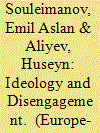| Srl | Item |
| 1 |
ID:
174108


|
|
|
|
|
| Summary/Abstract |
Disengagement from militant groups has often been explained in individual terms such as battle fatigue or the desire to rejoin family and friends. We seek to examine empirically which other factors, beyond individual-level determinants, have influenced disengagement processes among militants belonging to different types of Chechen militant organisations. Drawing empirical insights from unique in-depth interviews with former members of the Chechen insurgency, their relatives, eyewitnesses to the Chechen wars and experts with first-hand knowledge of the researched phenomena, this study examines disengagement among jihadist and nationalist Chechen militants. Focusing on group-level factors, such as the capacity to resist external pressures, the use of violence, in-group social bonds and group cohesion, this article demonstrates that disengagement has been a less viable course of action for Chechen jihadists than for nationalist militants.
|
|
|
|
|
|
|
|
|
|
|
|
|
|
|
|
| 2 |
ID:
139131


|
|
|
|
|
| Summary/Abstract |
The renowned Egyptian journalist and commentator Mohamed Hassanein Heikal (b. 1923) is arguably the doyen of Arab writers critical of the United States. Heikal's career as an author spans more than half a century and his access to regional and international audiences has been greatly enhanced in recent years by his regular appearances on the al-Jazeera television station. Drawing on Heikal's extensive published work, this paper offers a detailed treatment of his views on US politics, society and especially foreign policy in order to highlight the elements constituting the image of the United States that he projects. The article argues that Heikal’'s critical representation of the United States has been central to the discourse of Arab nationalists since the late 1950s and their reconstruction of Arab nationalist ideology along anti-American lines. It further argues that Arab nationalists and Islamists subscribe to essentially the same critical reading of the United States and its foreign policy, especially towards the Middle East. Because intellectuals help shape public opinion, this convergence of views between nationalists and Islamists represents a principal source of the negative image of the United States among Arab publics. Understanding the discourse of Arab intellectuals is thus instrumental for comprehending Arab views of the United States. The Arab Spring, with its tribulations and promises of change, brings an urgent need to properly understand and contextualize the discourse of Arab intellectuals, both nationalists and Islamists.
|
|
|
|
|
|
|
|
|
|
|
|
|
|
|
|